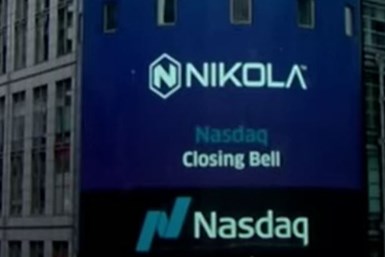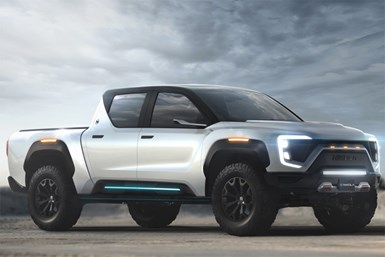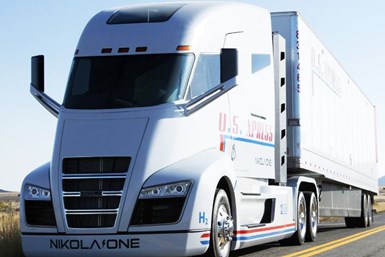Nikola's Stock Soars After NASDAQ Listing
Startup begins taking orders for fuel cell-electric pickup truck
Give yourself a pat on the back—and maybe a nice raise—if you invested in Nikola last week after the Arizona-based electric truck startup was listed on the NASDAQ exchange.

Image: Nikola
On Monday the company’s stock (NKLA) closed at $73 per share, more than double its opening price of $34 on June 4. Shares surged again early Tuesday to a high of $94, before finishing the day at about $75.
At the high-water mark, the company’s market capitalization hit about $33.8 billion (based on about 360 million outstanding shares).
This would make Nikola more valuable than Ford ($28.8 billion) and Fiat Chrysler ($15.8 billion), which closed at $7.24 and $10.18 per share, respectively, on Tuesday. General Motors, which closed at $29.86 per share, has a market cap of $42.8 billion.
Tesla-like Rise... and Lack of Profits
Nikola’s market parlay is reminiscent of Tesla’s meteoric ascent.
Tesla surpassed GM’s value in 2017, then zoomed by Volkswagen earlier this year. After briefly dropping to $360 at the beginning of the coronavirus pandemic—and sliding again in late April following an Elon Musk tweet—Tesla’s stock has rocketed to an all-time high of $950 per share—more than double its price at the beginning of the year, putting its value at an astronomical $164 billion.
The two EV companies have something else in common: neither has turned an annual profit. Tesla is expected to do so this year, after being in the black in each of the last three quarters.
Nikola won’t earn a dime this year and doesn’t expect to generate its first $1 billion in annual sales until 2023.
Pickup Orders
So what gives? Why the sudden interest in Nikola?
On Sunday, Trevor Milton, Nikola’s founder, announced the company would begin taking orders for the Badger concept pickup it unveiled in February.

Nikola Badger (Image: Nikola)
The 4-door truck teams a pair of electric motors with a fuel cell range extender. The combination generates 906 hp and 980 lb-ft of torque, while providing an estimated driving range of 600 miles (300 miles each on battery and fuel cell power).
In order to produce the Badger, however, Nikola needs to find a production partner. The company claims an announcement on this imminent.
Big Rigs Coming First
For now, Nikola is focusing on next year’s planned launch of the full-electric Tre Class 8 truck in partnership with CNH/Iveco, which invested $250 million into the startup last year.

Nikola One fuel cell truck
This will be followed by a pair of heavy-duty fuel cell trucks in 2023.
The company has 14,000 reservations for the big rigs, which it says are worth a combined $10 billion of sales. That’s assuming Nikola can turn the orders into binding contracts with deposits.
What’s Next?
Nikola’s stock listing was spurred by the company’s reverse merger with VectoIQ. The acquisition firm is led by former General Motors Vice Chairman Steve Girsky, who helped transition the carmaker out of bankruptcy.
The deal was finalized last week. In addition, Mark Russell, who had been president of Nikola since February 2019, was named CEO. He succeeds Milton, who remains Nikola’s executive chairman—and the company’s largest shareholder.
Nikola plans to use proceeds from the stock listing to accelerate vehicle development and to break ground on a 1-million-sq-ft factory near Phoenix. The company also aims to install 700 hydrogen refueling stations across North America.
The company anticipates reaching full production of about 30,000 fuel cell vehicles in 2027 and 15,000 battery-electric vehicles the following year. It hopes to be profitable by as soon as 2023.
RELATED CONTENT
-
When Automated Production Turning is the Low-Cost Option
For the right parts, or families of parts, an automated CNC turning cell is simply the least expensive way to produce high-quality parts. Here’s why.
-
Things to Know About Cam Grinding
By James Gaffney, Product Engineer, Precision Grinding and Patrick D. Redington, Manager, Precision Grinding Business Unit, Norton Company (Worcester, MA)
-
GM Develops a New Electrical Platform
GM engineers create a better electrical architecture that can handle the ever-increasing needs of vehicle systems








